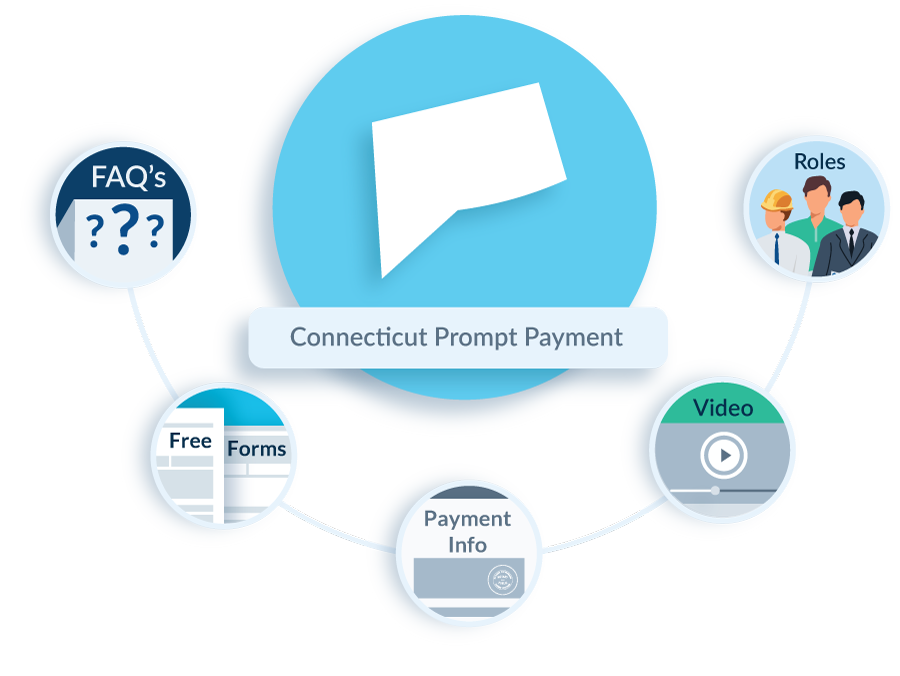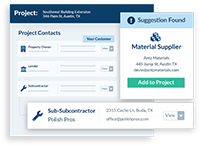Connecticut Prompt Payment Requirements
- Private Jobs
- Public Jobs
Prime Contractors
On private construction projects in Connecticut, the property owner must make progress payments to the general contractor within 30 days of request for payment.
Subcontractors
Once the GC receives payment, they must make payment to their subcontractors within 25 days.
Suppliers
Material suppliers in Connecticut are entitled to receive payment within 25 days after the hiring party receives payment.
Interest & Fees
Connecticut's prompt payment laws assess an interest penalty on late payments at 1% per month. The interest begins accruing 10 days after the property owner receives written notice of nonpayment from the unpaid party. Attorney fees may be awarded if a court finds the payments were withheld unreasonably.
Prime Contractors
On public projects in Connecticut, the hiring agency must pay the Prime Contractor within 45 days of request for payment, unless otherwise agreed.
Subcontractors
On public projects in CT, subcontractors are entitled to payment within 30 days after the hiring party receives payment.
Suppliers
Material suppliers on public projects in Connecticut are entitled to payment within 30 days after the hiring party receives payment.
Interest & Fees
Connecticut's prompt payment statute for public projects sets the interest penalty equal to the "monthly effective yield for the state short-term investment fund."
Connecticut’s prompt payment laws set a deadline for payments on both public and private construction projects. These statutes also assess penalties for late payments. This page explains exactly when those laws apply on construction projects in Connecticut, and details the deadlines and penalties.
Nearly every US state has prompt payment laws that regulate the acceptable amount of time in which payments must be made to contractors, subcontractors, and suppliers. These laws ensure that everyone on a construction project is paid in a timely fashion. These statutes provide a framework for the timing of payments to ensure cash flow and working capital.
Projects Covered by Connecticut Prompt Payment Statutes
The state of Connecticut regulates prompt payment on both private and public construction projects.
Private Projects
Private projects in Connecticut are governed by Conn. Gen. Stat. §§42-158i – 42-158j. These statutes regulate payment on all private construction projects in Connecticut, except:
- Projects funded by US Department of Housing and Urban Development
- Prime contracts of $25,000 or less
- Any residential projects containing 4 or less units
Payment Deadlines for Private Projects
On qualifying private projects in Connecticut, the property owner must pay the prime contractor within 30 days of invoice receipt.
Upon receipt of payment, the prime contractor has 30 days to make payment to their subs and suppliers. In turn, subcontractors must pay their subs or suppliers within 25 days of receipt of payment.
Penalties for Late Payment on Private Projects
Under Connecticut’s prompt pay laws for private projects, the interest rate on late payments is 1% per month until the balance is paid. However, in order to qualify to receive the interest penalty, the requesting party must send written notice of non-payment through registered or certified mail. The hiring party has 10 days to make payment after receiving the notice of non-payment before interest begins accruing.
Additionally, if the dispute goes to court or arbitration, attorney fees will be awarded if the withholding is deemed unreasonable.
Public Projects
The Connecticut statutes that govern prompt payment on public projects are found in Conn. Gen. Stat. §§4a-71 – 4a-75, and 49-41c. These laws regulate prompt payment on all public projects except highway/road construction or maintenance, or any contract paid exclusively by federal funds.
Payment Deadlines for Public Projects
On public projects in Connecticut, the hiring agency must pay the prime contractor within 45 days of either invoice receipt, or receipt of the goods and services, whichever is later. This deadline can be modified by the contract between the parties.
Once the prime contractor receives payment, they have 30 days from receipt to pay their subs and suppliers. This same 30-day deadline applies to subcontractors making payments down the chain.
Penalties for Late Payment on Public Projects
Payments that are late or wrongfully withheld begin accruing interest on the day payment is past due. Connecticut’s prompt payment interest rate for public projects is “equal to the monthly effective yield for the state short-term investment fund.”
Connecticut allows the hiring party to withhold payments if:
- The parties have a good faith dispute over the work or materials regarding the quality or quantity, or
- The materials were faulty or improperly installed.
If so, the party disputing payment must send notice before the date payment becomes due.




